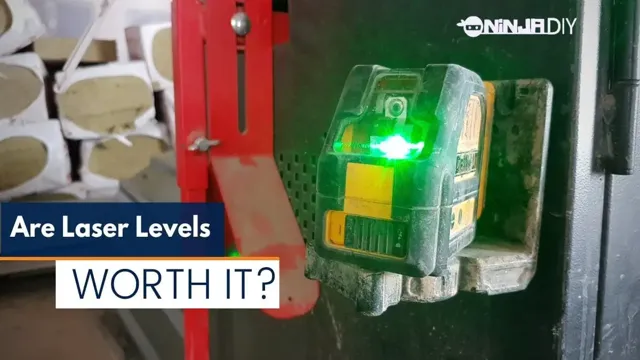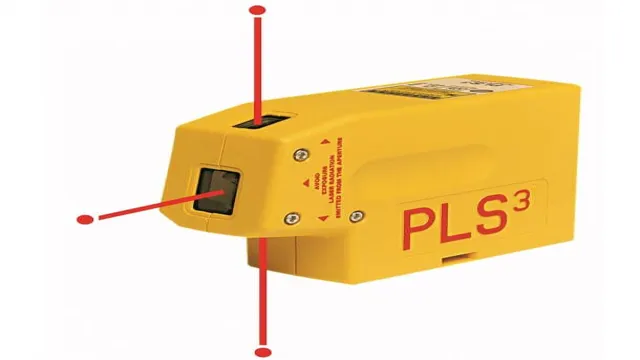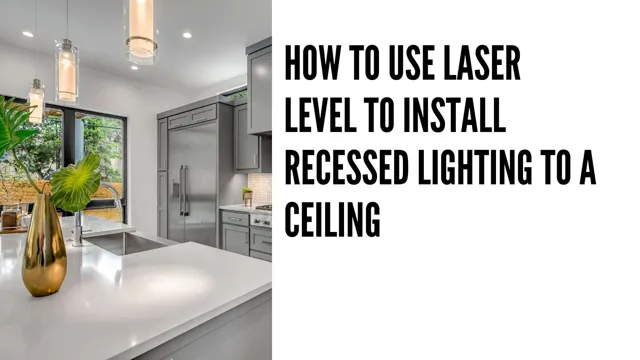Is a Laser Level Worth It: Pros and Cons of Investing in a Advanced Leveling Tool

Are you tired of uneven lines, crooked tiles, and poorly hung photos? Do you find yourself constantly repositioning your projects and second-guessing their accuracy? Perhaps it’s time to consider investing in a laser level. A laser level utilizes advanced technology to project a precise level line, allowing for quick and effortless leveling in various DIY projects. Its accuracy and speed can save you time and effort, enabling you to achieve a professional-looking finish with ease.
But is a laser level worth the investment? Well, it depends on the task at hand. If you’re only hanging a few pictures or replacing some tiles in a small space, a traditional level might suffice. However, for more complex projects that require precise measurements, such as building a deck or tiling an entire room, a laser level is a game-changer.
Moreover, a laser level can assist those with mobility issues or disabilities in achieving accurate leveling without needing assistance from others. It also minimizes the risk of accidents and injuries on the job site, making it a smart and safe investment. While a laser level may seem cost-prohibitive, its benefits and versatility make it a worthwhile investment for both professionals and DIY enthusiasts.
Whether you’re a seasoned builder or a weekend warrior, a laser level can elevate your projects to new heights, ensuring a pristine finish every time.
What is a Laser Level?
When it comes to home improvement or construction projects, a laser level can make a significant difference in the accuracy and speed of your work. A laser level is a tool that uses laser technology to project a straight, level line onto a surface, allowing you to align and position materials with precision. Whether you’re installing tiles, hanging shelves, or building a structure, a laser level can save you time and frustration.
But is a laser level worth it? If you’re a serious DIYer or a professional contractor, the answer is a resounding yes. A laser level can streamline your work, ensure accuracy, and ultimately save you money by reducing errors and minimizing rework. With a wide range of laser level options available, from basic models to advanced systems with multiple laser lines and automatic leveling features, there’s a tool that can benefit any project.
So if you’re wondering whether a laser level is worth the investment, the answer is clear: it’s a game-changer for any construction and home improvement work.
Definition and Purpose
A laser level is a precise measuring tool designed to help builders, carpenters, and DIY enthusiasts achieve a level line or plane with accuracy and speed. Unlike traditional bubble levels, laser levels use laser beams to project an accurate and straight line across a surface. The laser beam is transmitted through a prism or mirror to ensure an even distribution of light.
A laser level is typically used for a range of applications such as laying tiles, installing kitchen cabinets, and hanging ceiling lights. It can also be used outdoors for landscaping or grading purposes. One exceptional thing about a laser level is the level of accuracy it provides.
The accuracy of a laser level is usually measured in increments of fractions of an inch. Overall, a laser level is a versatile and efficient tool for anyone who wants to achieve a precise and accurate level line or plane at home or work.

Types of Laser Levels
A laser level is a precision tool used for construction or DIY projects to ensure level surfaces. This advanced device projects a laser line or dot, making it easier to find a level or plumb reference point. There are different types of laser levels that work for different requirements.
A line laser level projects a straight horizontal or vertical line, making it perfect for installing tiles or cabinets. There is also a dot laser level that projects multiple points of red and green lasers, allowing the user to set a reference point where the dot hits the surface. The rotary laser level is the third type that projects a 360-degree line.
This laser level is suitable for outdoor use and is ideal for large-scale projects. Before buying any laser level type, it is important to consider the accuracy range, range of operation, power source, and durability of the device. Therefore, having a clear understanding of the different types will help you choose the most suitable laser level based on your specific needs.
Benefits of Using a Laser Level
If you’re wondering if a laser level is worth the investment, the answer is a resounding yes! Not only do laser levels ensure a much more accurate and efficient way of leveling, but they also save time and energy in the long run. Unlike traditional levels that require manual adjustments and constant measurements, laser levels project a visible beam that makes leveling a hassle-free experience. They’re also extremely versatile, allowing you to use them for various tasks such as hanging shelves, installing tiles, and wallpapering.
Plus, the accuracy and precision offered by laser levels are unmatched, providing peace of mind that your work is done with optimal results. So, if you’re considering any home-improvement project, investing in a laser level is the way to go.
Accuracy and Precision
As a construction worker, you know the importance of accuracy and precision. That’s why you should consider using a laser level on your next project. One of the most significant benefits of using a laser level is that it provides you with extreme accuracy, which is essential for tasks such as installing flooring or drywall.
In addition, laser levels are easy to operate, saving you time and effort. They give you precise readings, allowing you to ensure that your work is straight and level, even on uneven surfaces. Overall, using a laser level provides you with a level of accuracy that traditional leveling tools simply cannot match, making it an essential tool for any construction worker.
So, why not add it to your toolkit today?
Speed and Efficiency
“Speed and Efficiency” Laser levels are a game-changer for anyone looking to take their projects to the next level. The benefits of using a laser level are vast, but the most significant advantage is speed and efficiency. These tools save hours of time, ensuring that your construction work is done quicker and with pinpoint accuracy.
With traditional tools, leveling requires multiple people and extensive measuring. A laser level eliminates the need for excessive man-hours, making it a simpler, more cost-effective option. Imagine the convenience of having a level line projected onto your surface, with complete accuracy and consistency.
The laser level will ensure that your work aligns exactly, making accuracy a priority and easy to obtain. Using a laser level is an investment that will save you time and effort, limiting any possibility of human error and ensuring your work is done to the highest standard.
Ease of Use and Convenience
Using a laser level can make your life so much easier and convenient. Whether you’re a DIY enthusiast or a professional contractor, a laser level saves you time and energy by eliminating the need to use traditional levels and plumb bobs. Its accuracy is unbeatable, and its convenience is unmatched.
The best part is that it’s easy to use, even for first-time users. You simply need to mount the laser level on a tripod or wall bracket, turn it on, and voila! You have an accurate, level line that makes your job a breeze. With a laser level, you can easily hang pictures, install shelves, lay tiles, and even build entire structures with unmatched precision, something that traditional tools cannot match.
Get your hands on a laser level today, and enjoy its many benefits!
Costs of Buying and Using a Laser Level
Is a laser level worth it? The answer is a resounding yes! Although a laser level may seem like a significant investment, its accuracy and functionality make it a valuable tool for DIYers and professionals alike. The cost of buying a laser level varies depending on the brand and features, but it’s essential to consider the long-term benefit of ownership. For instance, a laser level can save you time and money by reducing the need for multiple tools such as a spirit level, plumb bob, and chalk line.
Moreover, it provides speedy and precise measurements that are difficult to achieve with conventional tools. The cost of using a laser level is also minimal as it uses low-powered batteries that last for extended periods of use. Overall, a laser level is worth the investment as it offers efficiency, accuracy, and ease of use that can’t be compared to traditional measuring tools.
Initial Investment
One of the most important considerations when purchasing a new laser level is the initial investment cost. Depending on the type and quality of laser level that you require, prices can vary quite significantly. Entry-level models can be purchased for as little as $20, whereas more advanced models can range between $200 and $500.
However, it’s important to keep in mind that the cost of buying a laser level is just one aspect to consider. There are also ongoing costs associated with owning and using a laser level, such as maintenance and replacement of batteries and laser bulbs. It’s important to budget for these costs upfront so that you’re not caught off-guard should you need to replace parts unexpectedly.
Overall, while the cost of buying and using a laser level may seem daunting at first, it’s important to consider it as a long-term investment that will help you save time and money in the long run.
Maintenance and Repair Costs
Laser levels are a popular tool used for aligning various construction works. They are convenient, accurate, and efficient alternatives to the traditional spirit levels. However, like any other tool, there are costs associated with buying and using laser levels.
One of the significant costs is the initial purchase. Depending on the type and features, laser levels can be expensive. But there are many affordable models available in the market that are suitable for most construction works.
Besides the initial purchase, there are also maintenance and repair costs associated with laser levels. Proper maintenance practices like cleaning the lenses, calibrating the level periodically, and storing the device correctly can elongate the machine’s life and prevent repairs. But if any damages happen, repairs are necessary to ensure the tool’s accuracy.
These costs depend on the brand, model, and type of laser level. Generally, it is essential to factor in all these costs when considering buying a laser level, and it is advisable to purchase from a reputable brand that offers quality products and reliable customer support.
Factors to Consider When Deciding to Buy a Laser Level
Are you considering buying a laser level but wondering if it’s worth it? There are a few factors to consider before making a decision. First, think about the types of projects you typically work on. If you frequently need to level surfaces or hang items in a straight line, a laser level can save you time and provide more accuracy than traditional tools.
Additionally, consider the cost. Laser levels tend to be more expensive than other leveling tools, so it’s important to make sure you will use it enough to justify the investment. Finally, think about the ease of use.
Laser levels can be more complicated to set up and use than traditional tools, so make sure you are comfortable with the process before purchasing. Ultimately, if you frequently work on projects that require accurate leveling or alignment, a laser level can be a valuable tool worth investing in.
Type of Project
If you’re in the market for a laser level, there are a few factors to consider before making your purchase. Firstly, you need to determine what type of project you will be working on. Will it be indoor or outdoor? Will you be working on a flat or sloped surface? The type of project will affect the type of laser level you need.
Secondly, consider the level of accuracy you require. Do you need a laser level with a high level of precision, or will a basic model be sufficient? Thirdly, look at the range of the laser level. How far can it project, and will it meet your needs? Lastly, think about the power source.
Do you want a corded or cordless option? These are all important factors to consider when choosing the right laser level for your project. By taking the time to think through these considerations, you can make the right selection and ensure your project runs smoothly.
Frequency of Use
When you’re looking to buy a laser level, there are a few factors you should consider. One important factor is how often you’re going to use it. If you’re a professional contractor or construction worker who uses a laser level on a daily basis, you’ll likely want to invest in a higher-end model that can withstand heavy use.
On the other hand, if you’re a DIY homeowner who only needs a laser level for occasional projects, a more affordable and basic model may suffice. Additionally, you should consider what types of projects you’ll be using the laser level for. More advanced projects, such as those involving multiple angles or outdoor use, may require a higher-quality laser level.
Ultimately, determining the frequency of use and intended project types will help you make the best decision when purchasing a laser level. Whether you need a laser level for a one-time project or ongoing professional use, there is a model to fit your needs.
Budget
Budget When deciding to buy a laser level, budget is undoubtedly one of the key factors to consider. It’s important to determine what features are necessary and find a balance between price and functionality. A good laser level is a worthwhile investment but it’s important to not overspend on features that might not be necessary for the task at hand.
It’s also wise to consider the long-term cost of ownership, including replacement parts and batteries. Cheaper options may seem like a good deal in the short term but could end up costing more in the long run. Ultimately, finding a laser level that fits both your needs and budget is a priority for any buyer.
Conclusion
In the end, the question of whether a laser level is worth it comes down to just how much precision and accuracy you need in your projects. If you’re a DIY enthusiast who enjoys tackling small home improvement tasks here and there, a traditional bubble level is probably sufficient. But if you’re a professional contractor working on large-scale construction sites, investing in a laser level could make a world of difference in terms of efficiency and accuracy.
After all, when it comes to leveling, why settle for bubbles when you can have lasers?”
FAQs
What is a laser level?
A laser level is a device used to accurately and easily measure and mark a level line or slope using a laser beam.
How does a laser level work?
A laser level works by projecting a laser beam onto a surface, which creates a level line or slope that can be used as a guide for measuring, cutting, or installing.
What are the benefits of using a laser level?
Using a laser level can save time and increase accuracy in a wide range of tasks, such as hanging shelves, installing tile, or laying flooring.
Is a laser level worth the investment?
It depends on the specific tasks you plan to use it for and how frequently you will need it. However, for most people who frequently work on home improvement or DIY projects, a laser level is a valuable tool that can greatly improve the accuracy and efficiency of the job.
Are all laser levels the same?
No, there are different types of laser levels that are designed for specific tasks, such as rotary laser levels for outdoor use or cross-line laser levels for indoor use.
How do I choose the right laser level for my needs?
To choose the right laser level for your needs, consider factors such as the type of tasks you will be using it for, the range and accuracy you need, and your budget.
Can I use a laser level by myself or do I need help?
In most cases, you can use a laser level by yourself. However, if you are working on a larger project or need to cover a greater distance, you may need additional assistance.



